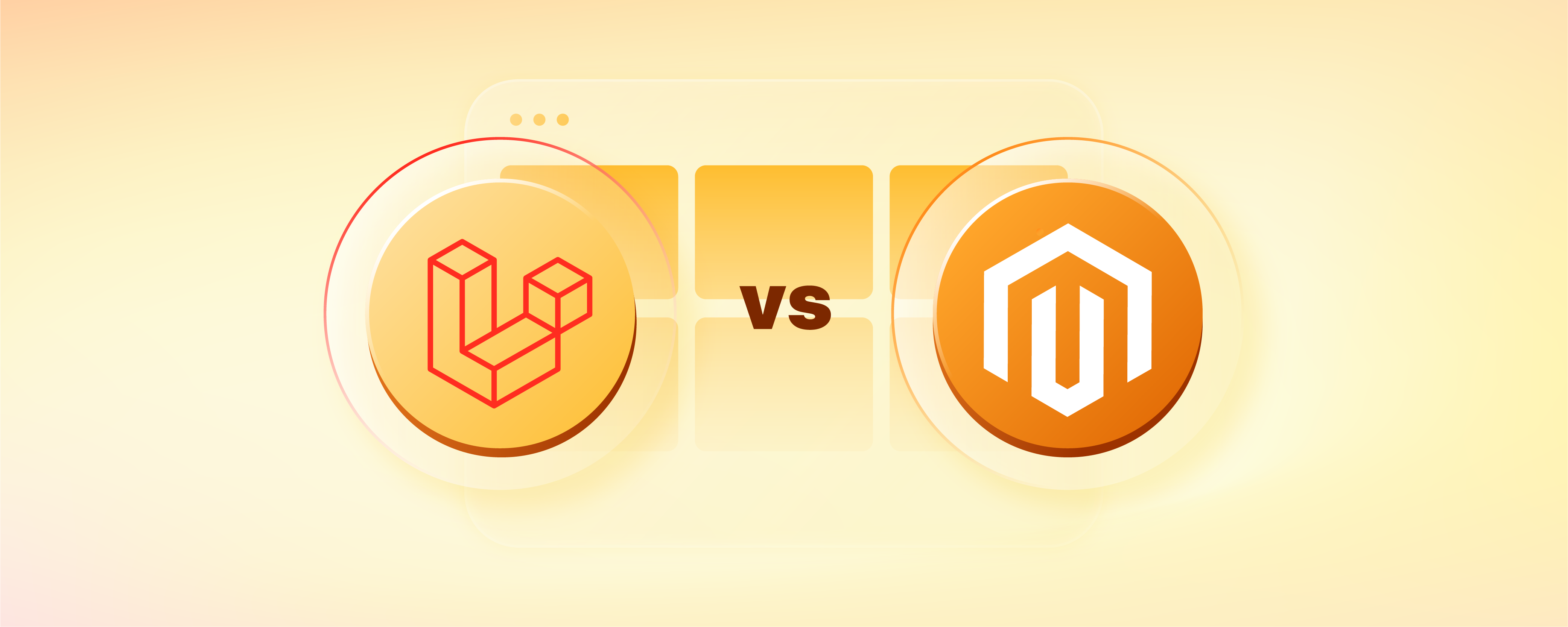
Magento Vs. Laravel: Best Framework for Your Ecommerce Needs
Confused with Magento vs Laravel? The right framework for your Magento store. Magento powers online stores, while Laravel is a flexible web framework.
In this article, we will uncover the similarities and differences between both of them. It will help you choose the best one for your requirements.
Key Takeaways
-
Explore the key features of Laravel, a versatile PHP web framework.
-
Examine the specialized features of Magento, a leading e-commerce platform.
-
Understand the similarities between Magento and Laravel in architecture and community support.
-
Uncover the differences between Magento and Laravel in architecture and performance.
-
Discover the top solutions within each ecommerce framework.
What is Laravel?
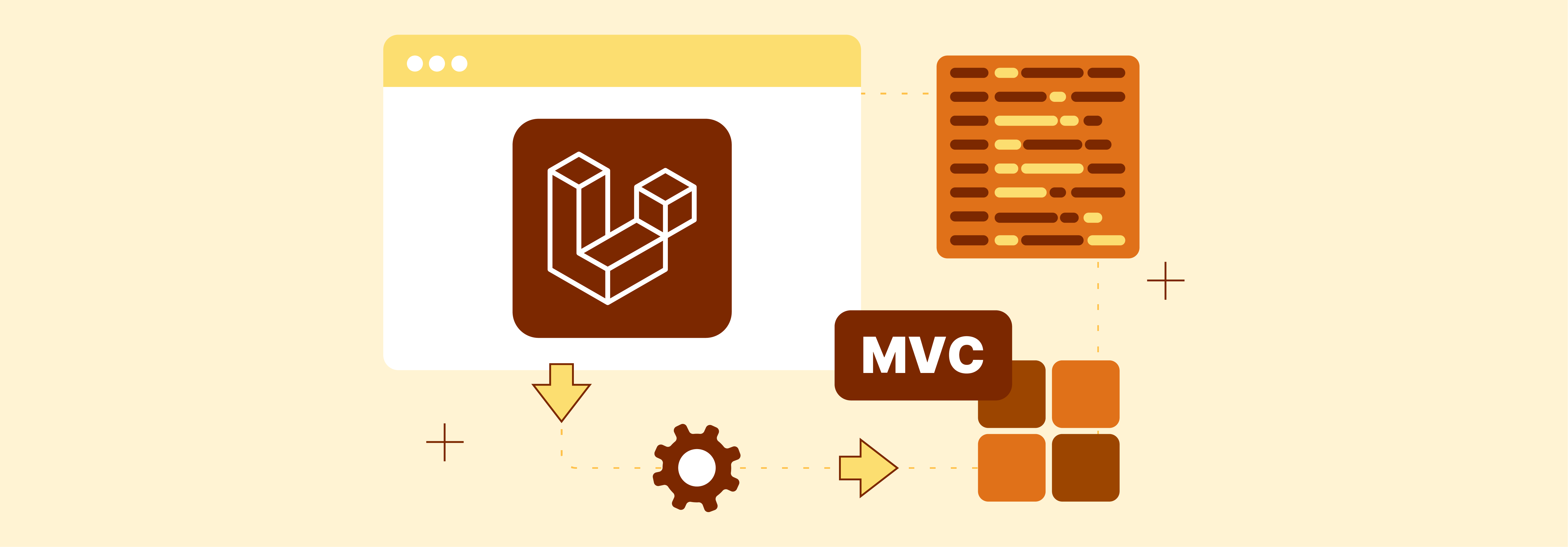
Laravel is a free, open-source web framework written in PHP.
It is used for building web applications following the model-view-controller (MVC) architectural pattern. Taylor Otwell created it, and it was first released in 2011. Laravel offers:
-
Elegant syntax
-
Developer-friendly features
-
Powerful ecosystem.
These features make it one of the most popular PHP frameworks for ecommerce development.
Key Features of Laravel
1. Expressive Syntax
Laravel emphasizes readability and simplicity in its syntax. It allows laravel developers to write clean and easy-to-understand codes. It also helps developers write code quickly and efficiently. These help reduce development time and effort.
2. Model-View-Controller (MVC) Architecture
MVC is a software design pattern. It separates an application into three main components:
-
Models
-
Views
-
Controllers.
In Laravel, models represent the data and business logic of the application. Views handle the presentation layer. Controllers manage the application's logic. It acts as an intermediary between models and views.
3. Routing
Routing in Laravel refers to the process of mapping HTTP requests. These are mapped to specific actions or controllers in the application.
The powerful routing system allows developers to:
-
Define application routes using a simple and expressive syntax
-
Handle various HTTP request methods (GET, POST, PUT, DELETE)
-
Support route parameters and route naming.
4. Database Migration and Seeding
Laravel's migration feature allows developers to define and manage database schema changes. It is done using the PHP-based syntax. It makes version control and sharing changes across different environments easier.
Database seeding refers to populating the database with initial or test data. Laravel provides tools for easily seeding the database with sample data.
5. Eloquent ORM
Eloquent is Laravel's built-in ORM (Object-Relational Mapping) system. It provides an intuitive and expressive way to interact with the database.
The ORM-based coding allows developers to define database models as PHP classes. It makes performing common database operations easier, such as:
-
Querying
-
Inserting
-
Updating
-
Deleting records using object-oriented syntax.
Similarities Between Magento and Laravel
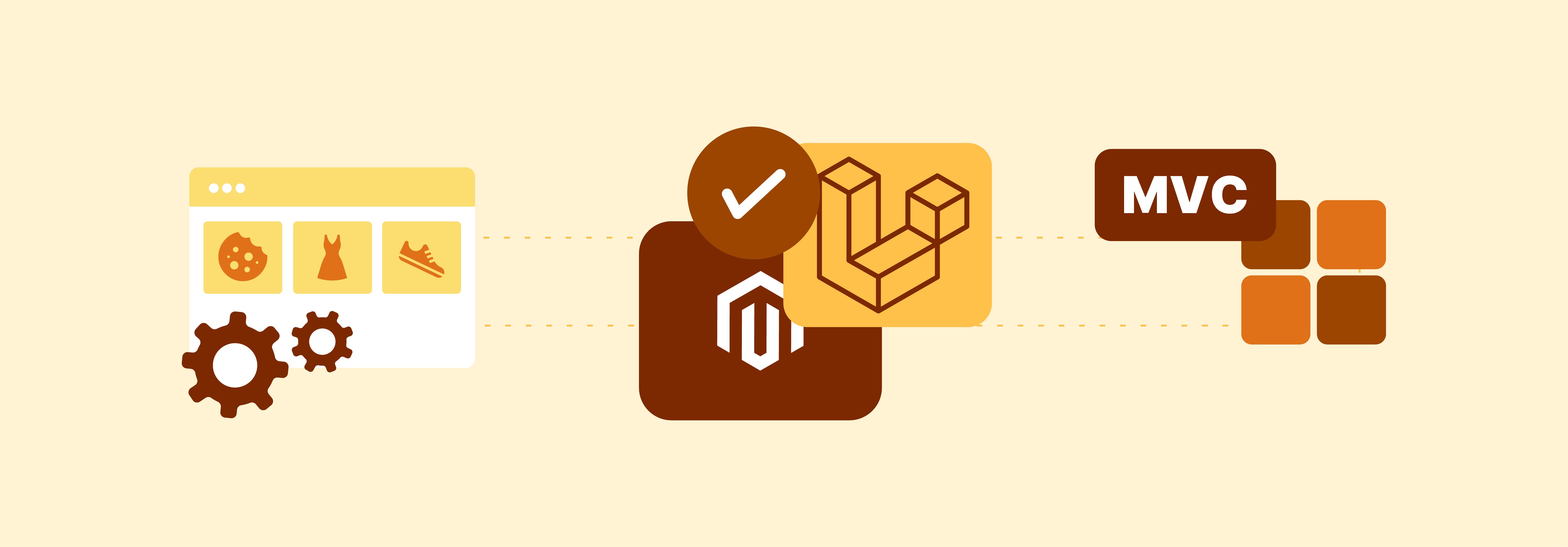
| Feature | Magento | Laravel |
|---|---|---|
| MVC Architecture | Magento implements a modular MVC architecture, allowing for the separation of concerns. The architecture promotes code organization and maintainability in large-scale e-commerce applications. | Laravel also follows an MVC pattern. This architectural design enhances code readability and reusability. It also makes the code scalable across various types of web applications. |
| Composer Dependency Manager | It leverages Composer to manage packages and libraries. It also helps developers integrate third-party components, extensions, and updates. | It also relies on Composer for package management. It enables developers to add, update, and manage dependencies. It also simplifies the installation of Laravel packages. |
| Object-Oriented Programming | It emphasizes object-oriented programming (OOP) principles. It allows developers to create reusable, modular code components. It also facilitates code abstraction, encapsulation, and polymorphism. These enhance the application's flexibility and extensibility. | It encourages the use of object-oriented programming paradigms to develop clean, structured code. Features like classes, interfaces, and traits promote code encapsulation, inheritance, and polymorphism. |
| RESTful APIs | It offers support for building RESTful APIs. This enables seamless integration with external systems, mobile applications, and third-party services. It also helps create custom endpoints, authenticate requests, and manage resources. | It provides comprehensive tools and libraries for developing RESTful APIs. It allows developers to design scalable, stateless APIs with ease. It also helps developers create endpoints for data manipulation, authentication, and communication. |
| Database Support | It supports various database management systems. These include MySQL, PostgreSQL, and SQLite. They provide flexibility in database selection and configuration. It allows developers to execute SQL queries, manage transactions, and manipulate data. | It offers support for many database systems. These include MySQL, PostgreSQL, SQLite, and SQL Server. They give developers the freedom to choose the most suitable database. It also simplifies database operations by mapping database tables to PHP objects. |
| Authentication and Authorization | It provides built-in support for user authentication and authorization. Magento allows developers to secure access to resources and restrict user privileges. It also helps enforce role-based access control. Magento's authentication mechanisms include customer authentication, admin authentication, and OAuth integration. | It includes comprehensive authentication and out-of-the-box authorization features. It enables developers to secure access to routes, controllers, and resources. It provides pre-built components for user registration, login, password reset, and email verification. |
Differences Between Laravel and Magento
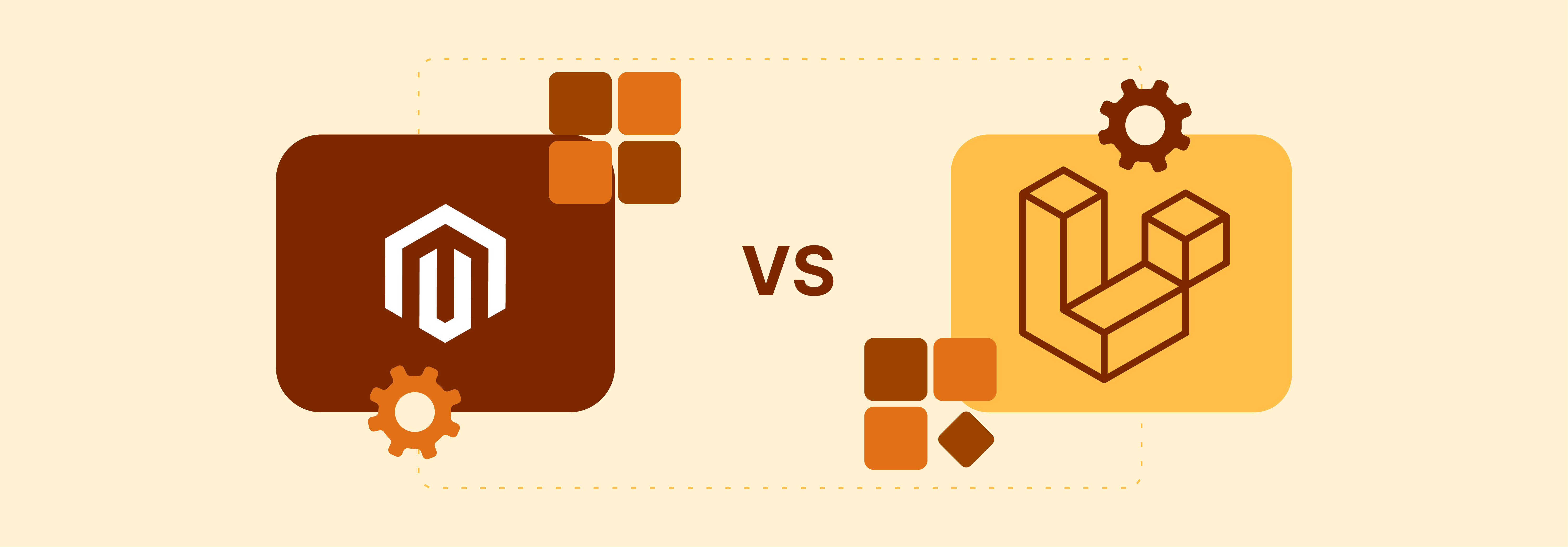
| Feature | Magento | Laravel |
|---|---|---|
| Focus and Purpose | It is primarily designed to build e-commerce platforms and manage online stores. It comes with built-in features tailored for e-commerce operations. These include product management, inventory tracking, and order processing. | It is a reliable web application framework suitable for a wide range of web applications. It provides a flexible and expressive syntax. It also includes features for routing, database management, authentication, and middleware. |
| Architecture | It follows a modular Model-View-Controller (MVC) architecture. It is optimized for scalability and extensibility in the context of e-commerce. The architecture includes modules for managing products, customers, orders, and payments. | It also follows the MVC architectural pattern. It offers more flexibility in project structure and architecture. Developers can organize code using MVC components or opt for alternative architectures. These include service-oriented architecture (SOA) or domain-driven design (DDD). |
| Community and Ecosystem | It has a dedicated community focused on Magento development. It offers themes, extensions, and integrations tailored for online stores. Magento provides resources, forums, events, and extensions specific to e-commerce projects. | It has a diverse community with interests beyond e-commerce. It offers various packages, tutorials, forums, and events on different web development topics. These include API development, microservices, content management, and more. |
| Learning Curve | It features a steeper learning curve. Developers may need to familiarize themselves with Magento's specific concepts. These include architecture and e-commerce-related terminology. | It is known for its developer-friendly and expressive syntax. It is relatively easier for developers to get started. It offers extensive documentation, tutorials, and community support for developers' accessibility. |
| Performance and Scalability | It is optimized for scalability and performance. It includes features like full-page caching, indexing, and multi-server architecture support. It may need optimization to manage large-scale ecommerce websites. | It provides a solid foundation for building scalable web applications. It may need optimizations for high-traffic or resource-intensive applications. Its flexibility allows developers to fine-tune performance. |
Top 3 Magento Solutions
1. Magento Commerce
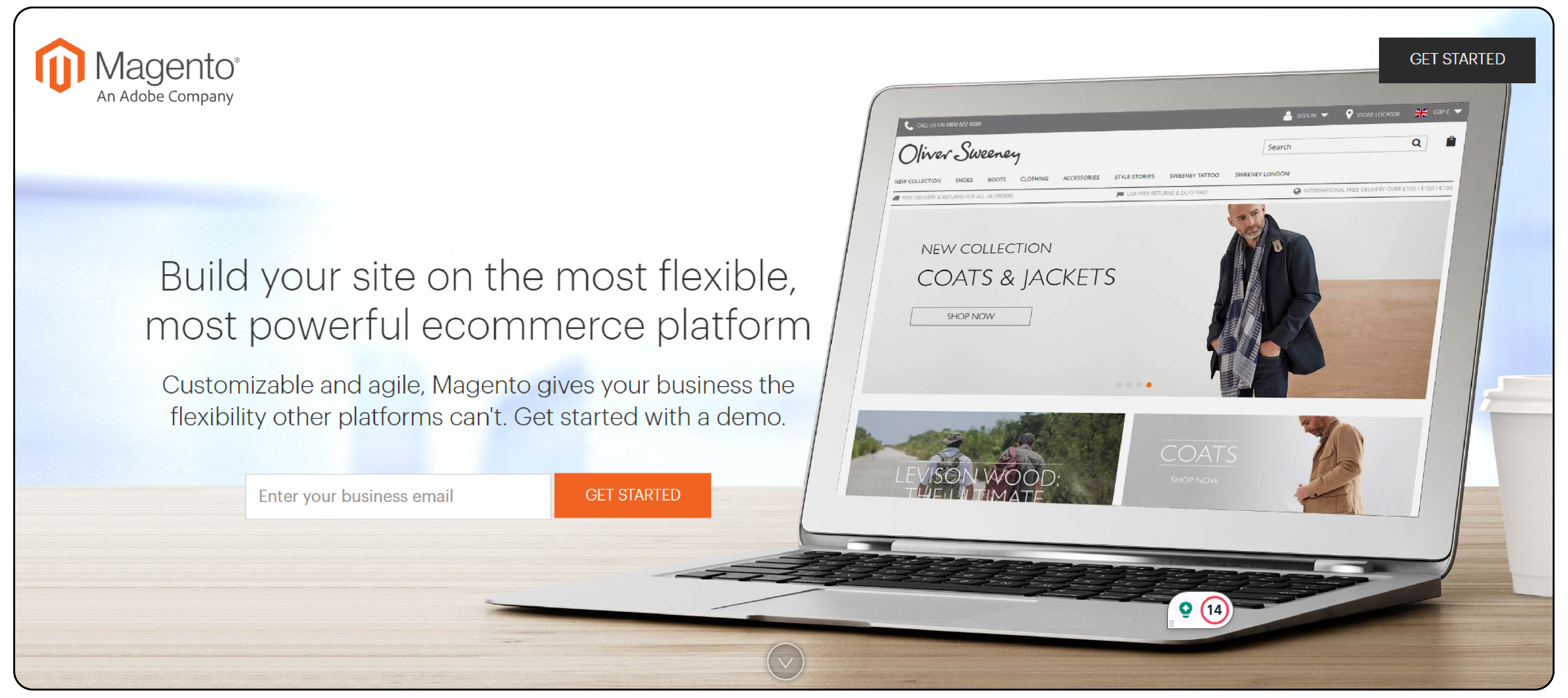
Magento Commerce is formerly known as Magento Enterprise Edition. It is a powerful ecommerce platform designed for large businesses and enterprises. It offers advanced features such as:
-
B2B functionality
-
Advanced marketing tools
-
Content staging.
Many leading brands and retailers use MagentoCommerce to power their ecommerce stores.
2. Magento Open Source
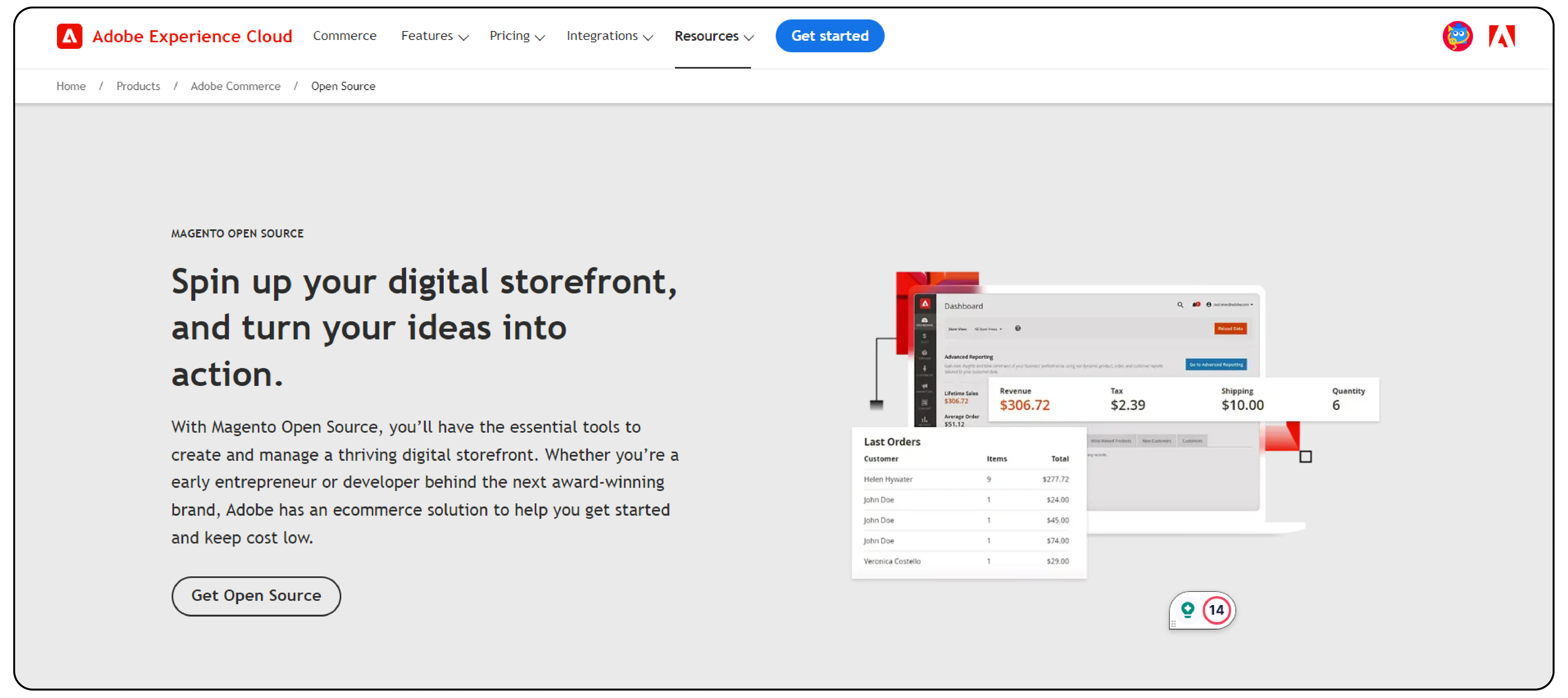
Magento Open Source is formerly known as Magento Community Edition. It is a free, open-source version of Magento. It helps design small to medium-sized businesses. It provides essential e-commerce features like:
-
Product management
-
Catalog management
-
Checkout
-
Payment processing.
Many startups use Magento Open Source as a cost-effective solution for their online stores.
3. Magento Extensions
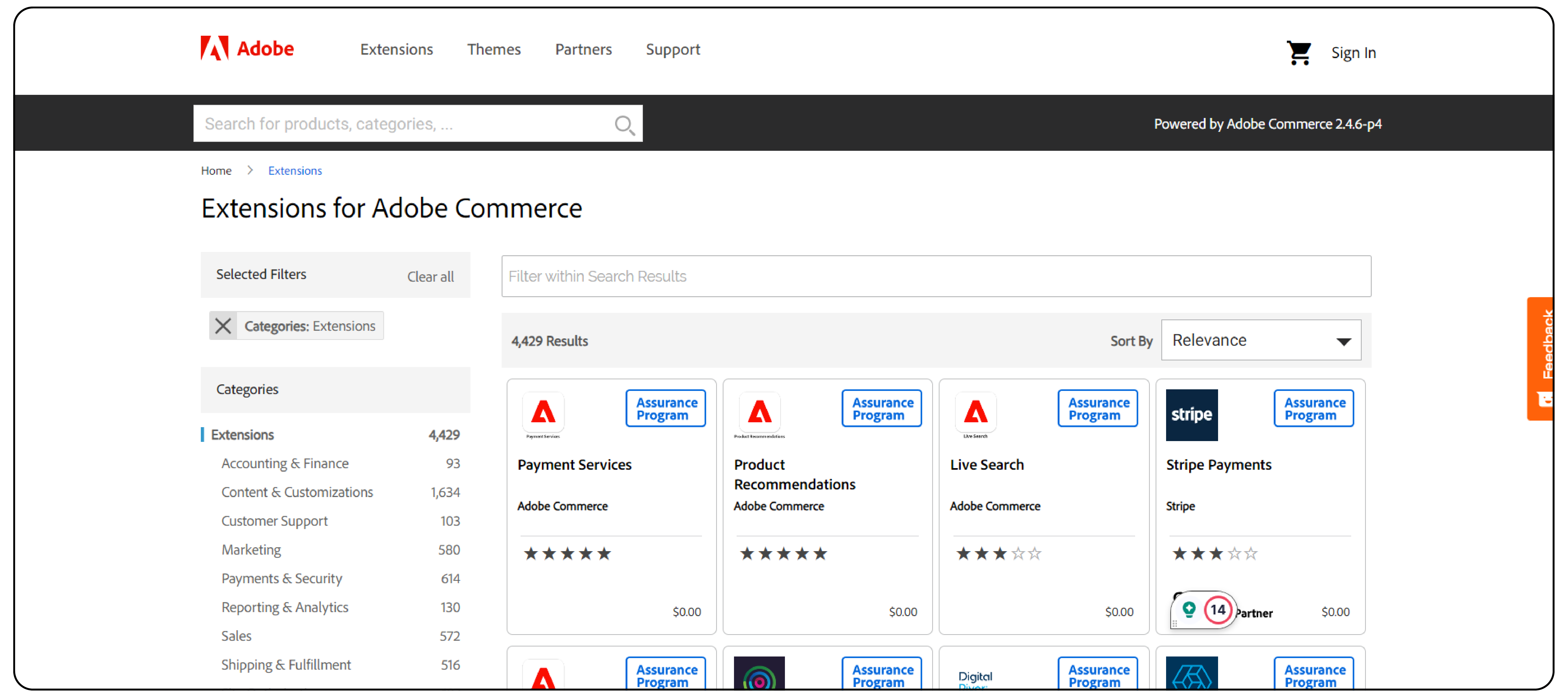
Magento has a vast marketplace of extensions and modules developed by third-party vendors. These extensions extend the functionality of Magento by adding features such as:
-
Payment gateways
-
Shipping integrations
-
Marketing tools.
Some popular ecommerce Magento extensions include Amasty, Aheadworks, and Mageplaza.
Top 3 Laravel Solutions
1. Laravel Nova
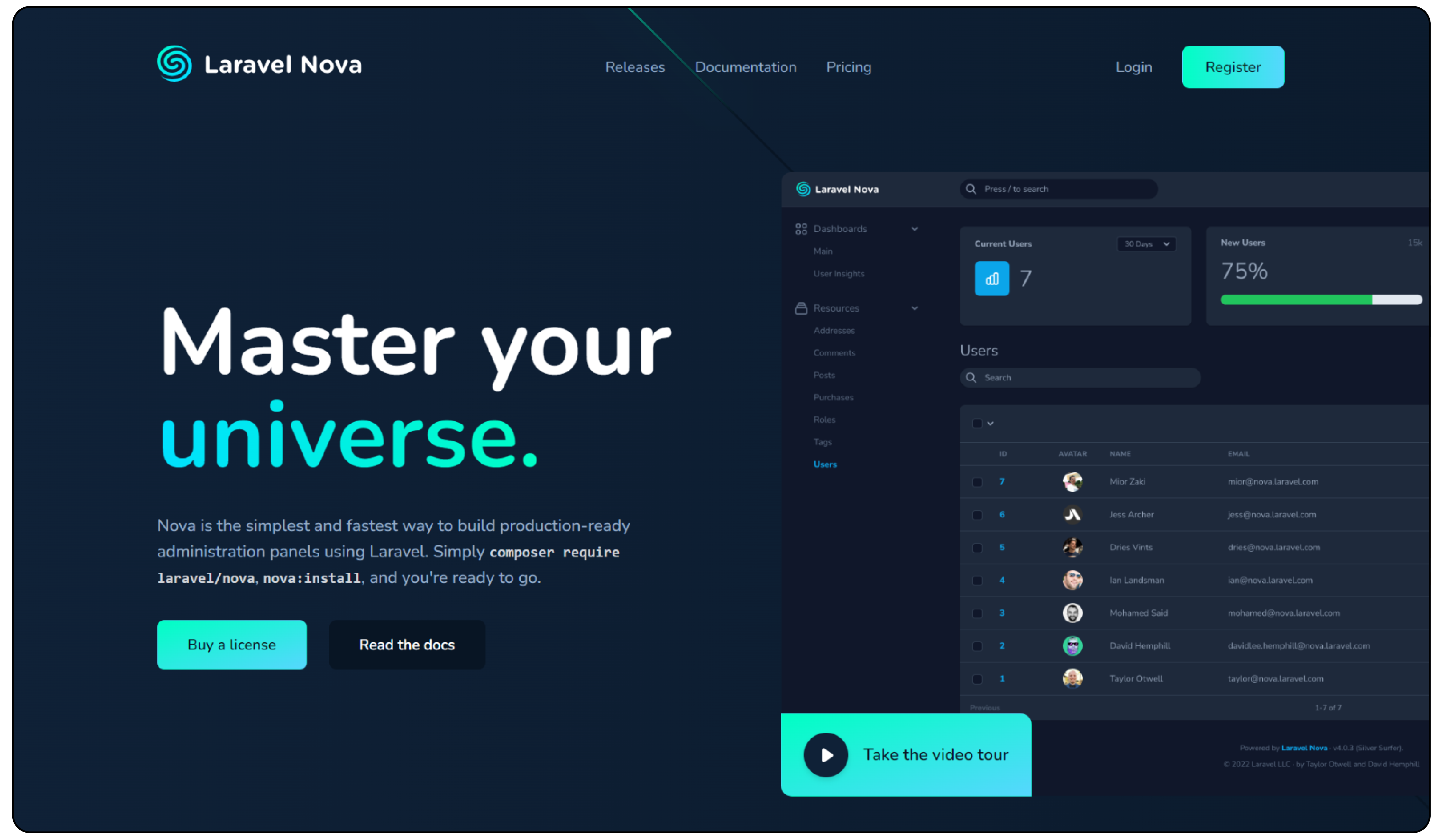
Laravel Nova is a beautifully designed administration panel for Laravel applications. It provides a powerful dashboard and CRUD (Create, Read, Update, Delete) interface. It helps manage resources such as users, roles, permissions, and more.
It simplifies the development of complex back-office systems and administrative interfaces.
2. Laravel Spark
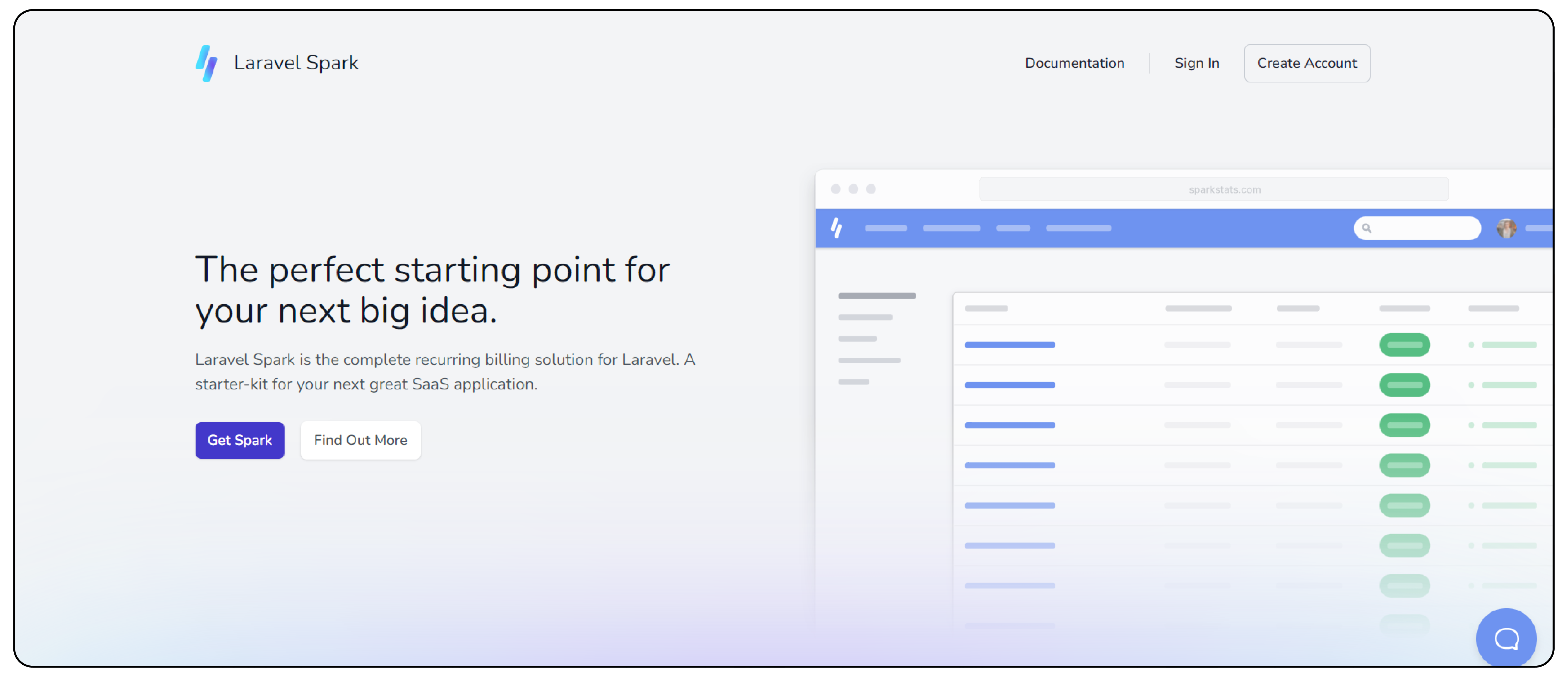
Laravel Spark is an application designed to start the development of SaaS applications using Laravel. It provides features such as:
-
User authentication
-
Billing integration with Stripe
-
Subscription management
-
Team collaboration.
It accelerates the development of subscription-based web applications.
3. Laravel eCommerce Packages
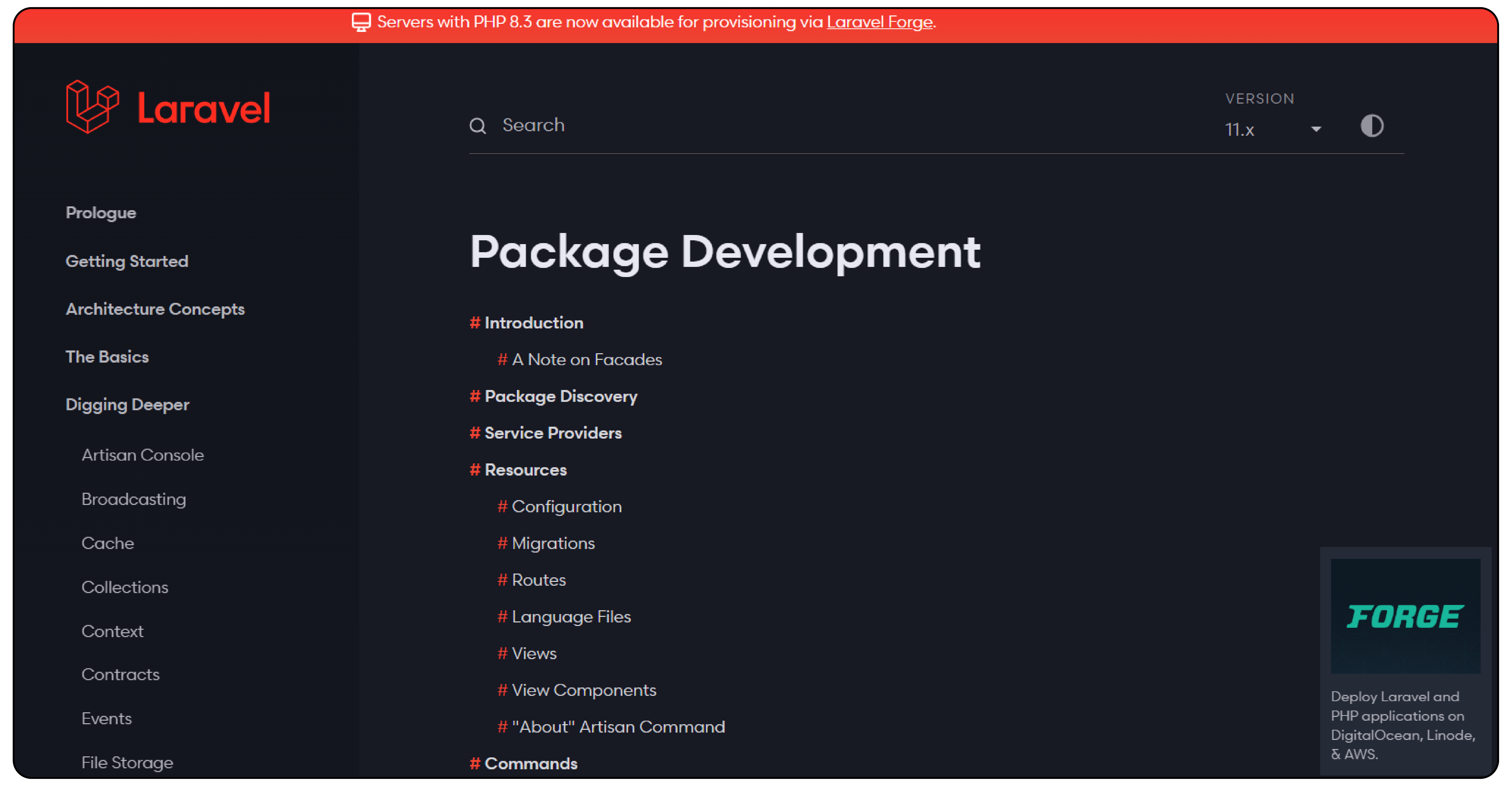
Several Laravel packages are available to build ecommerce solutions. For example, Aimeos is a Laravel package that provides a full-featured e-commerce platform. It offers features like:
-
Product management
-
Order management
-
Checkout
-
Payment processing.
FAQs
1. What is the main difference between Laravel and Magento?
Laravel is a PHP framework primarily used for web application development. Magento, on the other hand, is a comprehensive e-commerce platform. It is specifically designed for building online stores.
2. Is Laravel a suitable alternative to Magento for building e-commerce websites?
Laravel is much like Magento in the sense that it provides a powerful foundation for building web applications. It inclues e-commerce sites. Laravel offers flexibility and customization, whereas Magento offers specialized e-commerce features.
3. How does the Laravel framework compare to Magento in terms of development complexity?
Laravel PHP framework is known for its elegant syntax and simplicity. It makes it easier for developers to create and maintain applications. Magento is powerful for e-commerce. Its complexity can be higher due to its specialized nature.
Summary
Choosing between Magento vs Laravel, two popular frameworks for web development, can be challenging. This article uncovers several points for you to make an informed decision:
-
Laravel offers simplicity and flexibility through its expressive syntax and MVC architecture.
-
Magento offers specialized tools for product management, inventory tracking, and order processing.
-
Both frameworks follow MVC architecture and use Composer for package management.
-
Top solutions within both frameworks include Magento Commerce and Laravel Nova.
Ready to upgrade your Magento 2 store? Consider managed Magento hosting for optimal performance and hassle-free management.



